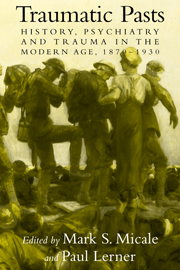Book contents
- Frontmatter
- Contents
- Contributors
- Preface
- 1 Trauma, Psychiatry, and History: A Conceptual and Historiographical Introduction
- Part One Travel and Trauma in the Victorian Era
- Part Two Work, Accidents, and Trauma in the Early Welfare State
- 4 Event, Series, Trauma: The Probabilistic Revolution of the Mind in the Late Nineteenth and Early Twentieth Centuries
- 5 The German Welfare State as a Discourse of Trauma
- Part Three Theorizing Trauma: Psychiatry and Modernity at the Turn of the Century
- Part Four Shock, Trauma, and Psychiatry in the First World War
- Index
- Titles in the series
4 - Event, Series, Trauma: The Probabilistic Revolution of the Mind in the Late Nineteenth and Early Twentieth Centuries
Published online by Cambridge University Press: 14 October 2009
- Frontmatter
- Contents
- Contributors
- Preface
- 1 Trauma, Psychiatry, and History: A Conceptual and Historiographical Introduction
- Part One Travel and Trauma in the Victorian Era
- Part Two Work, Accidents, and Trauma in the Early Welfare State
- 4 Event, Series, Trauma: The Probabilistic Revolution of the Mind in the Late Nineteenth and Early Twentieth Centuries
- 5 The German Welfare State as a Discourse of Trauma
- Part Three Theorizing Trauma: Psychiatry and Modernity at the Turn of the Century
- Part Four Shock, Trauma, and Psychiatry in the First World War
- Index
- Titles in the series
Summary
On July 6, 1884, the law of accident insurance, an act with far-reaching consequences, became effective in the German Reich, marking the beginning of a social and legal policy that gave the modern state a new shape as a “société assurancielle.” Following the establishment of private accident insurance in the wake of the expansion of the railways, the introduction of a liability law in 1871, and the implementation of health insurance in 1883, the 1884 legislation created a new conception of what constituted an accident. Thereby the role of the physician was transformed; doctors became “surveyors” [Gutachter] who must establish whether an accident was an “adequate cause” of an injury and then assess its impact on the victim and the insurance company. Trauma as a consequence of accidents occupies a peculiar place in the realm of accident medicine: From “railway spine” and “railway brain” to “traumatic neurosis,” physical injuries increasingly lose importance and attention gradually shifts to the psychic sphere. Henceforth, the accident takes the form of psychic trauma and shock and enters the realm of psychiatry. The clinical picture of traumatic neurosis described in 1884 by the German neurologist Hermann Oppenheim establishes a direct link between accident and injury. It is not a matter of external and corporeal injury, but rather of a “pathologically altered psyche with abnormal reactions” that, according to Oppenheim, derives from a psychic shock.
- Type
- Chapter
- Information
- Traumatic PastsHistory, Psychiatry, and Trauma in the Modern Age, 1870–1930, pp. 81 - 91Publisher: Cambridge University PressPrint publication year: 2001
- 2
- Cited by



